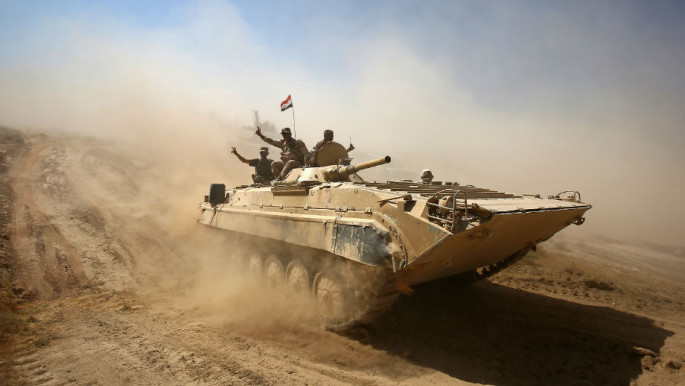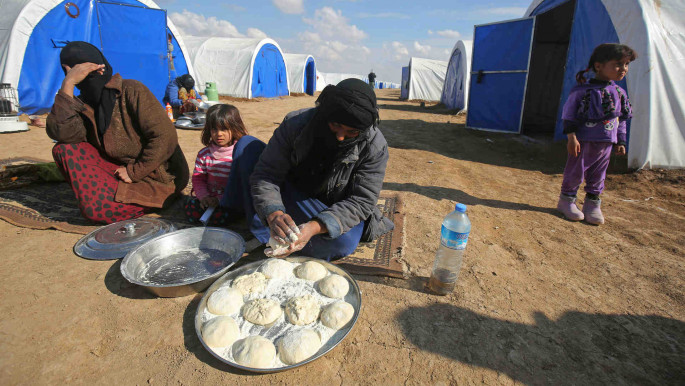The Iraq Report: Terror and corruption cripple hopes of stability
Click here to receive The Iraq Report each week in your inbox
Although Iraqi state-run and international media made the recapture of Mosul appear to be the final nail in the coffin of the so-called Islamic State, the reality is that IS continues to maintain an ability not only to conduct terrorist attacks inside Iraqi cities not under its control, but also to maintain its grip on key towns and cities.
As it becomes increasingly clear to the world that the fight against IS is far from over, another, longer struggle continues to rehabilitate Iraq to prevent it becoming a catalyst for extremism. The Iraqi state is still wracked by corruption on all levels, from low-level civil servants to executive office holders – and with corrupt officials now likely to receive amnesty through laws passed by other corrupt officials, it is unlikely that this battle will be ending anytime soon.
Assault on IS-held Tal Afar begins
The ground assault to recapture the predominantly Turkmen city of Tal Afar began on Sunday, with Iraqi Prime Minister Haider al-Abadi sending an ultimatum to IS fighters to either “leave or be killed”. So far, Iraqi forces have managed to retake a number of villages on the outskirts of the city while the US-led coalition has kept up an intense aerial bombardment campaign in support.
“I am saying to [IS] that there’s no choice other than to leave or be killed,” Abadi said. “We have won all our battles, and [IS] has always lost.”
Abadi failed to elaborate on how IS fighters would be expected to leave or to where they would flee - especially as Tal Afar, about 80 kilometres west of Mosul, has been under siege by Iraqi forces and the Iran-backed Popular Mobilisation Forces since early in the battle for Mosul last year.
While Abadi forbade the PMF from playing an active role in Mosul, they still managed to make their presence felt through semi-official operations – including a drive towards the Syrian border – while fighting inside Mosul itself, under the guise of official units from the Federal Police and the regular army.
The PMF’s involvement in the fight for Tal Afar has fuelled concerns that the population of the city may be at risk of sectarian reprisals - as in Tikrit, Fallujah, Ramadi, Jurf al-Sakhr and other areas previously held by IS.
 |
| Iraqi forces backed by the PMF advance towards Tal Afar , August 22 [AFP] |
Tal Afar is predominantly a Turkmen city, with a small Sunni Arab population. However, the Turkmen themselves are split almost equally between Sunnis and Shia. While some Shia Turkmen who were forced to leave their city by IS extremists joined the ranks of the PMF, Sunni Turkmen remain at grave risk of reprisals from PMF militants hailing from southern Iraq, as well as their former neighbours.
The PMF, also known as the Hashd al-Sha’abi in Arabic, is a predominantly Shia Islamist force that enjoys official recognition as a part of the Iraqi armed forces, while simultaneously operating as a parallel force to the regular army. This has led to speculation that Iran is grooming the PMF to be an Iraqi version of its own Islamic Revolutionary Guard Corps, a kind of praetorian force designed to prevent any counter-revolutions against the ruling Shia theocrats.
Selective investigation of war crimes
Last Wednesday, Iraqi Foreign Minister Ibrahim al-Jaafari sent a letter to the United Nations requesting help in gathering evidence against IS militants to charge them with war crimes. This move was hailed by top celebrity human rights lawyer Amal Clooney, who has championed the Yazidi cause.
Although Iraqi and Kurdish troops and militias have been accused of damaging evidence and disturbing crime scenes at alleged massacre sites in Sinjar, Clooney has long called for the prosecution of IS fighters for war crimes and genocide. “Yazidis and other [IS] victims want justice in a court of law,” she said. “And they deserve nothing less.”
Read more: Humanitarian crisis looms in shadow of Tal Afar battle
There is concern that the focus on war crimes prosecutions are targeting one set of perpetrators while ignoring others, threatening to undermine the gravity of the atrocities committed by IS extremists by politicising the issue.
Throughout the war against IS, the Iraqi military, police, intelligence services and PMF have all been accused of violating the human rights of Iraqis – particularly the Sunni Arabs – and committing sectarian motivated war crimes against them. While this has been going on for years, the most notable instance was when Germany’s leading news magazine Der Spiegel exposed elite Iraqi units of committing a string of atrocities, war crimes and human rights abuses in Mosul.
Even now, the PMF are training and recruiting child soldiers as young as nine to take up arms and join their religious martial order. A local official in Kirkuk told The New Arab that the PMF had set up a training camp for approximately 210 children in the village of Bashir “dedicated to train the children to take up arms” where they are also indoctrinated by Shia clerics in “extremist discourses”.
This comes despite US Secretary of State Rex Tillerson whitelisting Iraq from a list of states who recruit child soldiers in June. At the time, Human Rights Watch and the State Department warned Tillerson that Iraq had not done enough to prevent the recruitment of child soldiers. It now appears that their warnings were prescient, as Iraqi children are not only being armed with weapons, but also with radical and sectarian Shia Islamist ideology.
 |
| The UN has opened several camps outside Mosul for those displaced by the fighting in Tal Afar [AFP] |
Corrupt officials to be granted amnesty
The Iraqi government on Saturday made further progress in passing a bill through parliament that would grant amnesty to corrupt officials, including those languishing in jail and those who had fled the country after embezzling millions of dollars and profiting from kickbacks.
According to a lawmaker interviewed by The New Arab on condition of anonymity, the law will allow officials such as the imprisoned former governor of Salahuddin province, Ahmad al-Jubouri, and the recently disgraced governor of Basra, Majid al-Nasrawi, who fled to Iran, to return to public life with a clean slate.
This has led to widespread anger, as Iraqis continue to suffer from a lack of services resulting from state corruption – while officials are seen to be above the law. In order to ensure ordinary transactions and civil matters are dealt with, Iraqis often find themselves forced to bribe low-level officials otherwise they may never get anything as simple as a driving license issued.
Meanwhile, Iraqi government assessments that surveyed 12 provinces revealed on Sunday that 16 percent of Iraqis live in unsanctioned neighbourhoods and shanty towns. Illegal neighbourhoods became prevalent after the US-led invasion in 2003 and the collapse of the state, but have yet to be addressed, despite 14 years having passed since the toppling of Saddam Hussein.
The Iraqi minister for planning, Salman al-Jumaili, said that the survey only covered 12 provinces, as Salahuddin, Nineveh and Anbar suffered from security issues related to IS militants. The other three of Iraq’s 18 provinces are under the control and authority of the Kurdistan Regional Government which enjoys autonomy.
According to the report, the problem became exacerbated by the war against IS and a lack of planning in how to house internally displaced people. IDPs fled military hotspots and, with the destruction of their homes, either ended up in refugee camps or else boosted the populations of shanty towns, particularly in Baghdad and Basra.
The corruption crisis is exacerbated by the fact that Iraq – one of the richest countries in the world in terms of hydrocarbon resources – owes $112 billion to foreign creditors. Iraqi parliamentarians have warned that all of Iraq’s oil wealth would be spent on paying back banks and foreign countries if the crisis was not taken in hand soon.
Spme 67 percent of Iraq’s debts are reportedly owed to foreign creditors, while approximately 33 percent are to domestic creditors, who could be companies with direct investments in Iraqi infrastructure and energy development projects. With such a stranglehold on the Iraqi economy, and corrupt officials profiting richly from kickbacks, the Iraqi people will continue to suffer a lack of services while dealing with day-to-day corruption.
Click here to receive The Iraq Report each week in your inbox





 Follow the Middle East's top stories in English at The New Arab on Google News
Follow the Middle East's top stories in English at The New Arab on Google News


